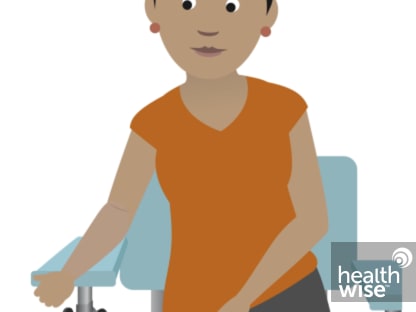Cell-free fetal DNA is a screening test to look for certain genetic conditions in a fetus that are caused by an abnormal number of chromosomes. It also can reveal the sex and blood type of the fetus.
This is a blood test that you have during pregnancy. The test can be done as early as 10 weeks in the pregnancy.
If this screening test is positive, it means there is a chance your baby has a genetic condition. In that case, your doctor or midwife may suggest that you have a diagnostic test, which can show if there is a genetic condition.
Why It Is Done
The test is used to look for genetic conditions caused by too many or too few chromosomes, such as trisomy 18 and Down syndrome (trisomy 21).
How To Prepare
In general, there's nothing you have to do before this test, unless your doctor or midwife tells you to.
How It Is Done
A health professional uses a needle to take a blood sample, usually from the arm.
Watch
How It Feels
When a blood sample is taken, you may feel nothing at all from the needle. Or you might feel a quick sting or pinch.
Risks
There is very little chance of having a problem from this test. When a blood sample is taken, a small bruise may form at the site.
Results
The fetal DNA will be looked at to see if there are missing or extra chromosomes. If there is an extra or missing chromosome (a positive result), your baby may have a genetic condition. A negative result means that your baby is unlikely to have one of the genetic conditions this test looks for.
This test can find up to 99% of trisomies such as 18 and 21. That means that it will find these conditions up to 99 times out of 100 and won't find them 1 time out of 100.
Related Information
Credits
Current as of: July 15, 2025
Author: Ignite Healthwise, LLC Staff
Clinical Review Board
All Ignite Healthwise, LLC education is reviewed by a team that includes physicians, nurses, advanced practitioners, registered dieticians, and other healthcare professionals.
Current as of: July 15, 2025
Author: Ignite Healthwise, LLC Staff
Clinical Review Board
All Ignite Healthwise, LLC education is reviewed by a team that includes physicians, nurses, advanced practitioners, registered dieticians, and other healthcare professionals.


